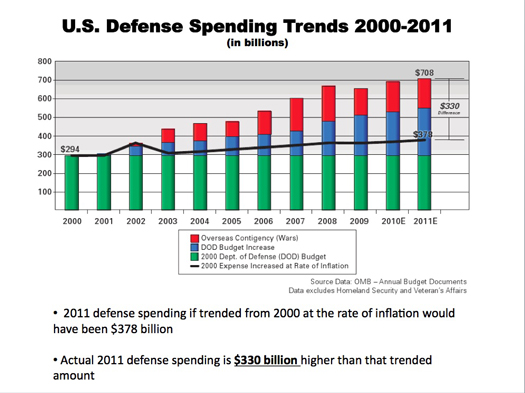
This graphic representation of what the U.S. enthusiasm for wars in the '00s cost in the federal budget reminded me of a passage from David Fromkin's Europe's Last Summer: Who Started the Great War in 1914? Fromkin is describing the milieu of political and national antagonism that made space for a little band of student aspirant killers to fix on shooting an Austrian archduke and thus create a pretext for a world war.
Osama bin Laden is dead, but he and his little band sure knew how to goad dumb leadership in Washington into spilling blood and treasure on a grand scale. Neither the Eastern or the Western set of arrogant fanatics cared much about who died.What distinguished terrorists from ordinary assassins was that they did not necessarily desire the immediate consequences of their violence. ... Their unique strategy -- the strategy of terrorism -- was to frighten society into doing something that the terrorists wanted society to do. An ordinary assassin shoots John Doe because he wants John Doe dead. A terrorist assassin shoots John Doe, whose life or death may be a matter of indifference to him, because he wants the authorities to react in a certain way to the killing.
Steve Clemons, who thought up the graphic, pointed out:
Instead our rulers debate in Washington which poor people will pay for the war binge touched off by the embrace of retaliatory and gratuitous violence -- will it be the sick? the disabled? the elders? the students? all of these?The US has spent cumulatively $2.263 trillion more than the FY2011 baseline. ... The other interesting take-away is that $2.263 trillion [in unanticipated spending for war after 9/11] roughly equates to about 7 million sustained jobs in the private U.S. economy, sustained over these entire ten years.
It seems pretty clear that bin Laden got what he wanted. Can we imagine how to get what most of us want -- a country that values peace over power, a political system that works for the non-rich majority, a better future for coming generations?
No comments:
Post a Comment